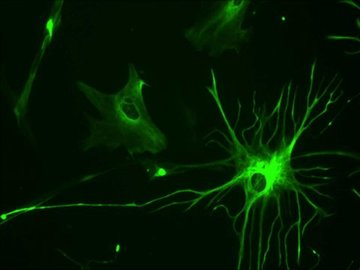
IMAGE: Researchers at MIT have found a neural circuit
astrocytes that helps us build long-lasting memories. This neural circuit works best when the brain is paying attention to what we are seeing. Paying attention to something causes the release of a neurotransmitter called acetylcholine that stimulates the neurocircuit. Read more:
'Because we think sequentially and no faster than the speed of life, we cannot pay attention to everything effectively. Our attention becomes too scattered to be of any use. You’ll find that your intention will create criteria, which will determine what—out of the vast range of possible experiences—you are attending to at the time, will help you reach your goal. In short, what you intend determines what you perceive in your world.
Let us imagine that your intention is to make a canoe. You will have, at first, some idea of the kind of canoe you wished to make. You will visualize the kind of canoe you wish to make. You will visualize the canoe, then you will go into the woods and look at the trees. Your desired outcome will determine your criteria for the tree you need. Your criteria might involve size, usefulness, and beauty of the tree. Criteria both filter your perceptions and invest a particular situation with meaning and thereby, informs your experience and behaviour at the time. Out of the many trees in the woods, you will end up focusing on the few that meet your criteria, until you find the perfect tree.
You will cut the tree down; remove the branches from the trunk; take off the bark; hollow out the trunk; carve the outside shape of the hull; form the prow and the stern; and then, perhaps, carve decorations on the prow. In this way you will produce the canoe.
The process is so ordinary, so simple, so direct that we fail to see the beauty and simplicity of it. You have the intention to make a canoe, visualize an outcome, and give birth to something whole, a canoe. Your intention to make a canoe gives you direction and also imposes criteria on your choices, consciously and unconsciously.
Intention has a way of bringing to our awareness only those things that our brain deems important. You’ll begin to see ideas for your canoe pop up everywhere in your environment. You’ll see them in tables, magazines, on television, and in other structures, while walking down the street. You’ll see them in the most unlikely things, such as a refrigerator, that you use every day without giving them much thought. How the brain accomplishes such miracles has long been one of neuroscience’s great mysteries.'
So the sudden insights we gain when we are struggling with a problem that has occupied us for a while are merely the brain paying attention to aspects of our problem as we go about our daily lives and unconsciously drawing our attention (consciousness) to what it discovers in the process. It might seem like a mysterious process and it is a wonderful feeling when it happens but our brain is merely doing what it is designed to do...
The paper I wrote for Macao
| developing_students_creativity.pdf |




 RSS Feed
RSS Feed